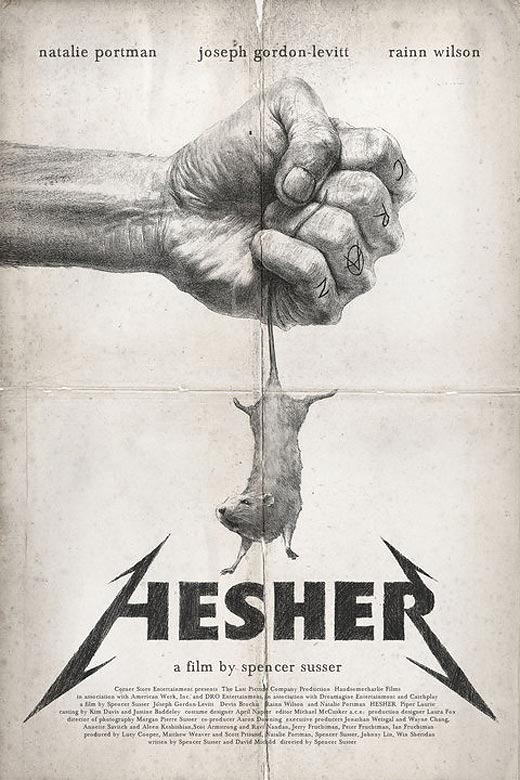
CRACKS (2009, directed by Jordan Scott, 104 minutes, U.K.)
HESHER (2010, directed by Spencer Susser, 100 minutes, U.S.)
BY DAN BUSKIRK FILM CRITIC Society’s expectations of women has led to their condescendingly being referred to as “the gentler sex,” but isn’t this diminished expectation why it is so fun to watch women on-screen when they go stark raving mad? From Sissy Spacek in Carrie, to Bette Davis in Whatever Happened to Baby Jane, and Faye Dunaway in Mommy Dearest, it is a special kind of thrill to watch women when they lose all composure and let their psyches run wild. Cracks, the debut film from Ridley (Blade Runner) Scott’s daughter Jordan Scott, journeys to the dark side of women’s psychology, trapping us at an isolated girls school in 1931 where despite its genteel setting, all is not sugar and spice. The girls love their instructor Miss G, (Casino Royale‘s Eva Green), who regales the students with her stories of touring the globe, a life so exciting it’s hard to imagine why such an exotic creature stays at this claustrophobic island setting. The girls all feel abandoned at this private school purgatory and Miss G seems to enjoy handing out divine favor and allowing the girls to jockey for her approval.
Eva Green’s self-satisfied teacher may remind you of Maggie Smith’s Oscar wining role in 1969’s The Prime of Miss Jean Brodie, but Miss G’s pathology is more disturbed then Miss Brodie’s embrace of Fascism. Her inner nature is uncovered with the arrival of Fiamma (Maria Valverde), a true blue aristocrat whose appearance leads the school’s dean to instruct the girls to treat their new classmate with a special deference. Miss G coaches the school’s diving team and Fiamma’s athletic grace leads Miss G.to knock her current class pet Di (Juno Temple) down a few notches, a disruption whose consequences are downright life-threatening. Directed with a visual lushness that should make her father proud, Ms. Scott imbues the films with a Gothic sense of dread,.as we watch the volatile tensions within the school slowly gather a deadly steam.
Cracks serves as an intense character study that gives Eva Green her richest showcase yet. Since her libertine debut in Bertolucci’s  The Dreamers in 2003, Green’s classic beauty has often been used elegant window dressing in lavish costume epics. Over the course of this film, director Scott lets us see Miss G as her students see her: first as a worldly and cultured guide, then slowly as the cracks form, a disturbed and terribly needy child herself. Green transforms her character from within. Still outwardly beautiful, she takes on a bug-eyed, spidery quality that more closely resembles her fractured soul. In its final act, Cracks sets its characters set adrift into an unknown world, a final unnerving coda to a ghoulishly satisfying tale.
The Dreamers in 2003, Green’s classic beauty has often been used elegant window dressing in lavish costume epics. Over the course of this film, director Scott lets us see Miss G as her students see her: first as a worldly and cultured guide, then slowly as the cracks form, a disturbed and terribly needy child herself. Green transforms her character from within. Still outwardly beautiful, she takes on a bug-eyed, spidery quality that more closely resembles her fractured soul. In its final act, Cracks sets its characters set adrift into an unknown world, a final unnerving coda to a ghoulishly satisfying tale.
– – – – – – – – – – – –
Hesher is a bold, engaging, and terribly half-baked film. At its center is a powerful performance by Inception’s Joseph Gordon-Levitt as a shirtless heavy-metal loving title character who inserts himself into a grieving family’s household. Gordon-Levitt”s foul-mouthed nihilism steals every scene he is in but the actor is ultimately left adrift in a film pretty much clueless about its own deep thoughts.
Devin Brochu is T.J., the junior high school student who is bullied at school and ignored at home. The source of his dysfunction is the recent death of his mother, which has left him and his father (Rainn Wilson) to wander in a lonely funk after moving in with T.J’s grandmother (the legendary Piper Laurie). Their grief lies unspoken, but one day it arrives in a human form as the long-haired Hesher (Gordon-Levitt), a young man seemingly without a past who drives a beat-up black van that blasts Metallica. He moves into to their home, plopping down on the family couch to watch porn, scream obscenities and occasionally light things on fire. Nobody much notices Hesher but T.J., who alternates between trying to befriend and doing battle with this wily intruder.
Director/co-writer Spencer Susser seems very pleased with himself for taking Hesher to the metaphoric level and in the second half he works hard to show us that this family all has a lesson to learn by confronting the messy feelings of grief that Hesher represents. You need a masterful control of tone to make such a premise work though, and Susser’s script wanders drunkenly between whimsical humor, serious drama and foul-mouthed tirades.
All problems stem from the pretty-much impossible character of Hesher. With his starved physique giving him the look of a drugged up L.A. bass player, Gordon-Levitt is completely enthralling to watch, but ultimately the character as he written is impossible to play. He shouts down the still-childlike T.J. with sexually sadistic rants, he runs the kid down with his van and laughs, and terrorizes him with cartoonish, Bugs Bunny-style bundles of dynamite, complete with the sizzle and sparkle of a lit fuse. That this is all done to a young kid is tough to make whimsical but it is plainly too much for a guardian angel to pull off.
Natalie Portman has a superfluous role as the mixed-up older cashier that T.J. has a crush on, but Hesher’s callous seduction of her just adds a confusing side note that muddles his role as supernatural grief counselor. By the time the film arrives at its melodramatic catharsis (cue the somber U2-styled guitar theme) and Hesher delivered his sermon, the crowd released an audible “harumph” of disbelief at the story’s audacious attempt to go tear-jerker. He’s too manufactured a character to both love and hate, and you just end up just hating him for being such a fake invention. Hey Hesher, you’re a poseur.
